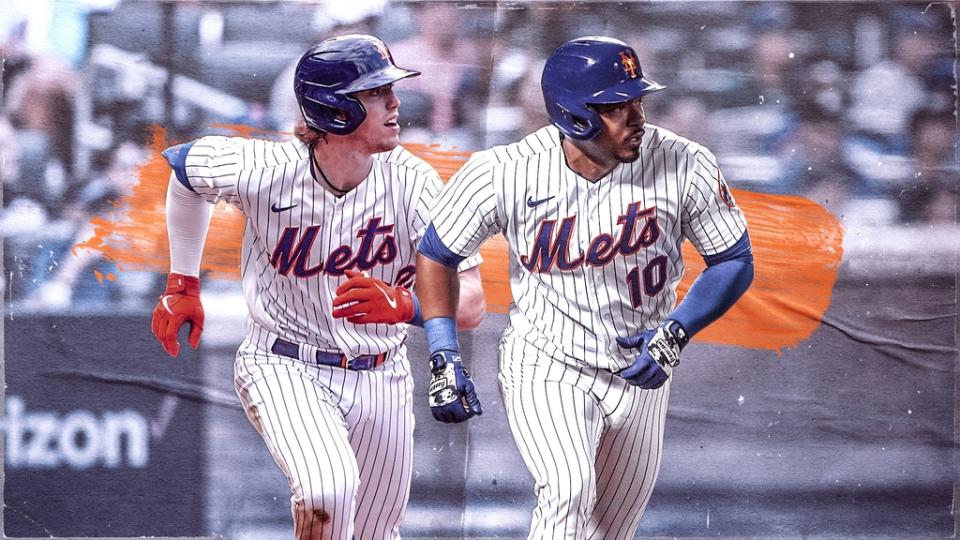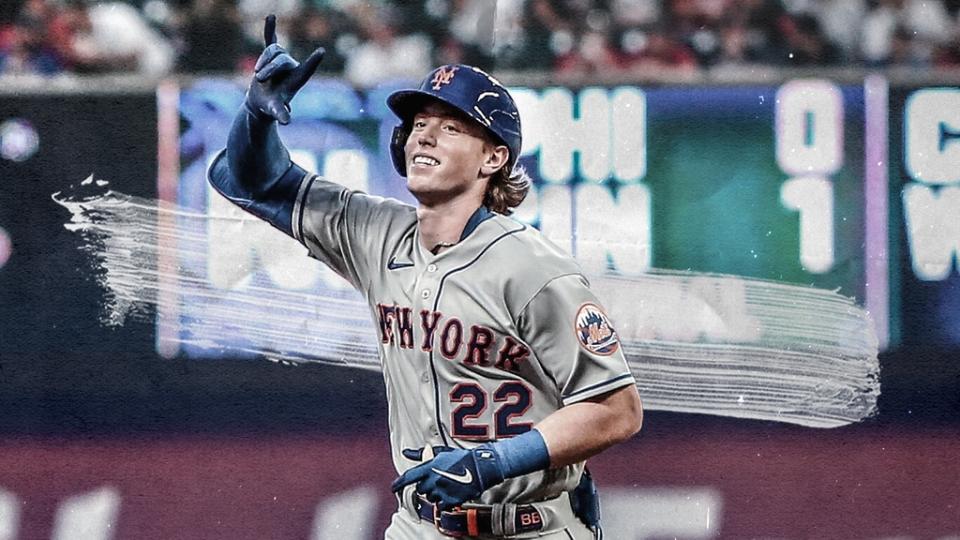
A few weeks ago, the expectation was that Carlos Correa would be the Mets’ third baseman not only in 2023, but for the next half decade or more.
Had the Correa deal been finalized, it would’ve likely led to a trade of Eduardo Escobar and to Brett Baty transitioning to left field.
But with Correa on the Minnesota Twins instead of the Mets, Escobar is still here, Baty is still in line to be the third baseman of the future in Queens, and the Mets have some decisions to make when it comes to how they’ll handle the situation at the hot corner as the 2023 season approaches.
Mets GM Billy Eppler told reporters last week that Escobar had a good season in 2022 and wouldn’t talk specifics when it came to how the playing time might shake out this season. But the truth is that Escobar did not have a good season in 2022, slashing .240/.295/.430 with 20 home runs in 136 games. And Escobar getting his slugging percentage to a respectable level was accomplished only because he caught fire in September.
Entering play last Sept. 2, Escobar was slugging .380 and had hit just 12 home runs. He deserves credit for turning it around over the final month, but Escobar was a serious drag on the offense over the first five months of the season.
Additionally, Escobar’s defense at third base was quite bad according to multiple metrics.
Escobar was worth -11 DRS in 1,108.2 innings at third base after being worth -5 DRS there in just 268.2 innings in 2021.
Going by Outs Above Average, Escobar was among the worst fielders in baseball — in the eighth percentile.
Escobar’s advanced offensive numbers via Baseball Savant were also mostly subpar in 2022, with him below average when it came to average exit velocity, hard hit percentage, xwOBA, xBA, strikeout rate, walk rate, whiff percentage, and chase rate. The few areas where Escobar excelled were barrel percentage (61st percentile), xSLG (69th percentile), and max exit velocity (78th percentile).
It also needs to be pointed out that the switch-hitting Escobar was a liability against right-handed pitching last season, hitting just .231/.294/.387 in 368 plate appearances, opposed to a .259/.299/.519 triple slash against lefties.
Escobar didn’t struggle as badly against righties in 2021 (hitting .238/.305/.448), but still fared much better against lefties (hitting .295/.340/.537).
And with Escobar entering his age-34 season, there’s no reason to expect a renaissance against right-handers. That takes us to Baty. But before we go in depth on him, let’s discuss Luis Guillorme for a second…
There was a time last season when Guillorme briefly put himself in the conversation when it came to regular playing time at third base and second base. And for good reason.
Guillorme has a tremendous plan at the plate, grinds out at-bats, is an all-World defensive player, and has gotten on base at a very good clip (.354 OBP) during his five-year career.
But as the season went on, Guillorme’s offense regressed. And while he finished just a tick above league average offensively in OPS+ (101), he cannot be in the conversation as an everyday or even platoon player — especially with the Mets still in need of more punch (Guillorme’s career slugging percentage is .334 and he has hit just four home runs in 280 games).
Now, let’s talk about Baty.
Baty was rushed up last season for his big league debut after just 11 games at Triple-A Syracuse because the Mets had a serious need.
Prior to his promotion, Baty was having a phenomenal year for Syracuse and Double-A Binghamton, slashing .315/.410/.533 with 19 homers and 22 doubles in 95 games.

In his brief taste of the majors (which lasted just 11 games because of a season-ending thumb injury), Baty didn’t blow the doors off. But he showed a good idea at the plate, flashed high exit velocities and pop (he hit two homers), and was not overmatched.
With Escobar’s overall offensive struggles in 2022 (including his shortcomings against righties) and his sagging defense, giving Baty the bulk of the at-bats against right-handers makes a ton of sense. But is Baty ready?
Baty is entering his age-23 season, has already experienced all levels of the minors, was not overwhelmed during his first big league action, and is one of the highest-ranked prospects in baseball for a reason. And while he might benefit from just a tad more seasoning in Triple-A, it’s hard to argue for him not starting the season with the Mets.
Not all prospects are created equal, but the Atlanta Braves have benefited from aggressively promoting their prospects recently. That includes Michael Harris IIwho spent just 43 games with Double-A last season before being jumped over Triple-A directly to the majors.
Had the Mets signed Correa, they could’ve let Baty develop a bit more in the minors while preparing him to take over in left field at some point in 2023. But they didn’t sign Correa.
If Escobar was in the Mets’ long-term plans or there was reason to believe he would provide pop against right-handers, giving him the bulk of the at-bats at least at the start of the 2023 season would make sense. But Escobar is likely in his final season as a Met (the team holds a $9 million club option for 2024), and strong production against right-handers should not be expected.
To pivot to another big prospect for a second…
If the Mets were planning on carrying Francisco Alvarez and giving him tons of at-bats from the get-go this season, it would make it less imperative to carry Baty right away. But the Mets’ plan with Alvarez is unclear.
Put it all together — Escobar’s struggles and the seeming end of his Mets tenure drawing near, Baty’s upside, the Mets’ serious need for more power — and it’s obvious that the two of them should begin the season in a platoon, with Baty starting against righties and Escobar against lefties.
But Baty is not expected to be a platoon player in the majors once he settles in. So if/when he proves he should be playing every day, the full-time job should be his. At that point, the Mets would have their answer at third base and a good problem on their hands with Escobar, who can either become a bench bat/DH option or be dangled via trade.